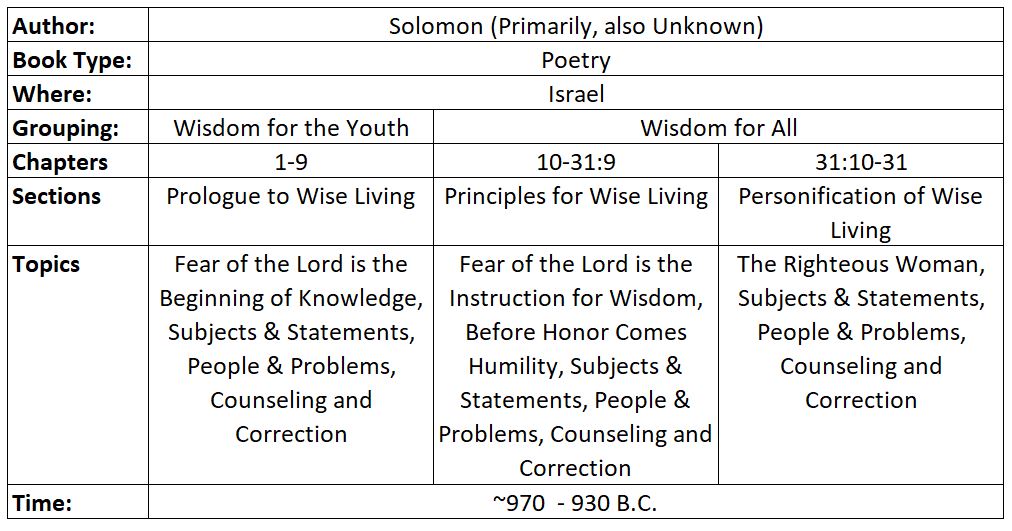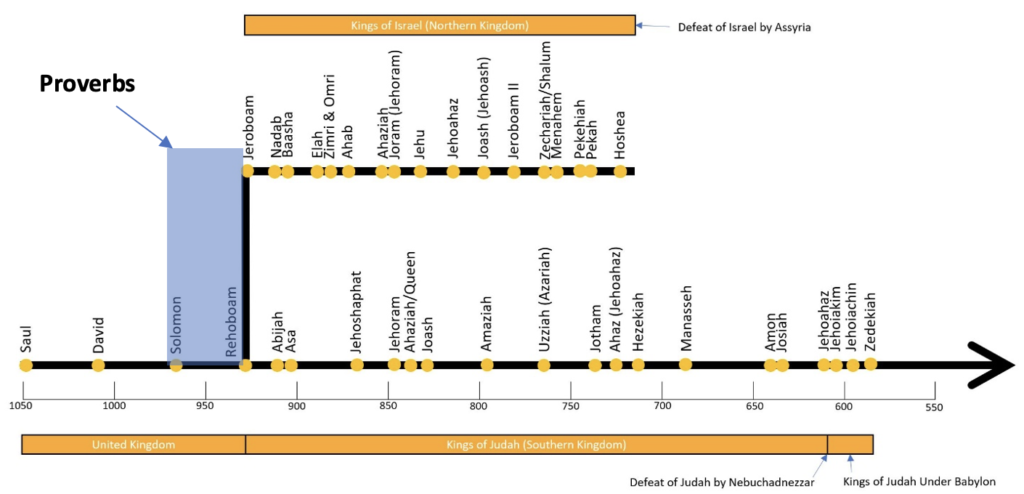Proverbs
Wisdom
Summary | About | Why You Should Read it | Author | When Written | Context | Timeline | Location | Outline | Observations | Resources
Summary
The Book of Proverbs is a collection of wise sayings and teachings attributed primarily to King Solomon, though other authors contributed as well. It is part of the Wisdom Literature in the Old Testament, offering practical guidance on how to live a good and godly life. Key themes from Proverbs include:
- Wisdom vs. Foolishness: Proverbs contrasts wise behavior with foolishness, encouraging readers to pursue wisdom, knowledge, and understanding. Wisdom is often personified as a woman, calling people to embrace righteous living.
- Fear of the Lord: Reverence for God is described as the foundation of wisdom. Those who fear the Lord are said to live morally upright lives.
- Moral Conduct: Proverbs emphasizes honesty, integrity, humility, kindness, and justice. It warns against pride, laziness, greed, and other vices.
- Family and Relationships: Instructions on parenting, marriage, and friendships are common, offering guidance on building harmonious relationships.
- Wealth and Poverty: The book discusses the benefits of hard work and diligence while cautioning against the dangers of wealth, particularly when obtained through dishonest means.
Proverbs is written in short, memorable sayings that are meant to be reflected upon and applied to everyday life. It is highly practical, focusing on character development and ethical living.
The following table provides a high-level look at the structure and contents of the book of Proverbs.

About
Proverbs is the 20th book of the Bible and the second of the books of Poetry in the Old Testament.

Why You Should Read It
The Book of Proverbs provides timeless wisdom and practical guidance for living a life that reflects God’s principles. Here are several reasons why it’s valuable:
- Foundation of Wisdom:
- Proverbs teaches that the “fear of the Lord is the beginning of wisdom” (Proverbs 1:7). This aligns with Christian faith, emphasizing reverence for God as essential to understanding life and making wise decisions.
- Moral and Ethical Guidance:
- The book offers practical advice on how to live with integrity, humility, honesty, and kindness, values central to Christian character. It addresses everyday challenges and encourages a lifestyle that pleases God.
- Encourages Spiritual Growth:
- Proverbs fosters spiritual maturity by calling Christians to pursue wisdom, discernment, and self-discipline. These traits are essential in growing closer to God and becoming more Christ-like.
- Helps Navigate Relationships:
- Whether it’s within the family, friendships, or work relationships, Proverbs offers clear advice on how to treat others with respect, patience, and love. These relational virtues align with Jesus’ teachings about loving your neighbor.
- Promotes Diligence and Hard Work:
- Proverbs emphasizes the importance of hard work, stewardship, and responsibility, principles that echo the Christian call to serve others and work diligently as unto the Lord.
- Warning Against Foolishness:
- Proverbs contrasts wisdom with folly, warning against pride, laziness, dishonesty, and greed—behaviors that lead people away from God’s will. It helps Christians avoid spiritual and moral pitfalls.
- Relevant to Daily Life:
- Its teachings apply to everyday situations, making it a practical guide for Christians seeking to align their actions with God’s purposes, whether in work, relationships, or personal conduct.
In essence, Proverbs serves as a blueprint for living a life of wisdom, virtue, and righteousness, which are all fundamental aspects of the Christian faith.
Author
King Solomon was offered a gift by God and he chose Wisdom. He was the wisest man on earth and had God’s blessing. He compiled the Proverbs over his years as king through all the lessons he learned, including through hardships and failures.
When Written
Solomon likely wrote the book of Proverbs during his reign as king from 970 to 930 B.C. with the majority written closer to the end of his reign.
Context
The Book of Proverbs was written in the context of ancient Israel, primarily during the reign of King Solomon (approximately 970–930 BCE). Here are some key contextual elements:
- Cultural Context:
- Ancient Wisdom Literature: Proverbs is part of a broader genre of wisdom literature that was common in the ancient Near East. It reflects the cultural practices and beliefs of the time, drawing on both Israelite and neighboring cultures’ insights into wisdom and ethics.
- Educational Purpose:
- Proverbs was likely intended for instruction, particularly for young men and future leaders. It aimed to equip them with the knowledge and skills necessary to govern wisely and live righteously in society.
- Socio-Political Context:
- During Solomon’s reign, Israel experienced a period of relative peace and prosperity. This environment allowed for the flourishing of wisdom literature as people sought to understand how to maintain societal order and personal integrity in times of stability.
- Religious Context:
- The text reflects the Israelite understanding of the covenant relationship with God. Wisdom is closely tied to following God’s laws and teachings. The authors sought to guide readers in living in a way that honored God and upheld moral and ethical standards.
- Community Values:
- Proverbs emphasizes communal values, highlighting the importance of family, friendship, and societal harmony. The teachings reflect a desire for individuals to contribute positively to their communities, reinforcing social cohesion and mutual respect.
Overall, Proverbs was written to provide practical wisdom and guidance in the context of a society that valued moral integrity and the pursuit of knowledge, helping individuals navigate the complexities of life in accordance with God’s principles.
Timeline
The timeline below shows from the first king to the start of the Exile. The Book of Proverbs was written during the reign of King Solomon
Location
Solomon reigned and wrote Proverbs from Jerusalem, in Judah, of Israel.
Outline
| I. Prologue: Purpose and Theme (1:1-7) |
| II. The Superiority of the Way of Wisdom (1:8;9:18) |
| A. Appeals and Warnings Confronting Youth (1:8-33) |
| 1. Enticements to secure happiness by violence (1:8- 19) |
| 2. Warnings against rejecting wisdom (1:20-33) |
| B. Commendation of Wisdom (chs. 2-4) |
| 1. Benefits of accepting wisdom’s instructions (ch. 2) |
| 2. Wisdom bestows well-being (3:1-20) |
| 3. Wisdom’s instructions and benefits (3:21-35) |
| 4. Challenge to hold on to wisdom (ch. 4) |
| C. Warnings against Folly (chs. 5-7) |
| 1. Warning against adultery (ch. 5) |
| 2. Warning against perverse ways (6:1-19) |
| 3. Cost of committing adultery (6:20-35) |
| 4. Warning against the enticements of an adulteress (ch. 7) |
| D. Appeals Addressed to Youth (chs. 8-9) |
| 1. Wisdom’s appeal (ch. 8) |
| 2. Invitations of wisdom and folly (ch. 9) |
| III. The Main Collection of Solomon’s Proverbs (10:1;22:16) |
| IV. The Thirty Sayings of the Wise (22:17;24:22) |
| V. Additional Sayings of the Wise (24:23-34) |
| VI. Hezekiah’s Collection of Solomon’s Proverbs (chs. 25-29) |
| VII. The Sayings of Agur (ch. 30) |
| VIII. The Sayings of King Lemuel (31:1-9) |
| IX. The Ideal Wife (31:10-31) |
Observations
- Concerning the proverbs of Solomon:
- According to 1 Kings 4:32, Solomon spoke:
- 3,000 proverbs.
- 1,005 songs.
- Only about 800 of Solomon’s proverbs are included in this Book of Proverbs.
- Therefore, 2,300 of his proverbs are not contained in the Book of Proverbs.
- According to 1 Kings 4:32, Solomon spoke:
- There is no Biblical information about Agur or Lemuel.
- Solomon’s great wisdom was well known during his day.
- In 1 Kings 3:9-12, Solomon asked for wisdom, and it was granted.
- 1 Kings 10:24 – “Now all the earth sought the presence of Solomon to hear his wisdom which God had put in his heart
- The key word in Proverbs is “wisdom,” meaning “the ability to live skillfully.”
- “Wisdom” means skill.
- “Instruction” means discipline.
- Proverbs provides detailed instructions for His people to deal successfully with the practical affairs of everyday life.
- How to relate to God.
- How to relate to neighbors.
- How to relate to parents.
- How to relate to government.
- How to relate to children.
- The Book of Proverbs is designed to:
- Prevent ungodly lifestyles.
- Remedy ungodly lifestyles.
- Included in Proverbs is instruction regarding:
- Wisdom and folly
- Righteousness and wickedness
- The tongue and speech
- Pride and humility
- Justice and vengeance
- The family
- Laziness and work
- Poverty and wealth
- Friends and neighbors
- Love and lust
- Anger and strife
- Masters and servants
- Life and death
- Drunkenness
- Proverbs 31 includes an acrostic of 22 verses (the first letter of each follows the complete Hebrew alphabet) portraying the virtuous woman.
Old Testament
New Testament
Free Resources
Other Resources
- x


